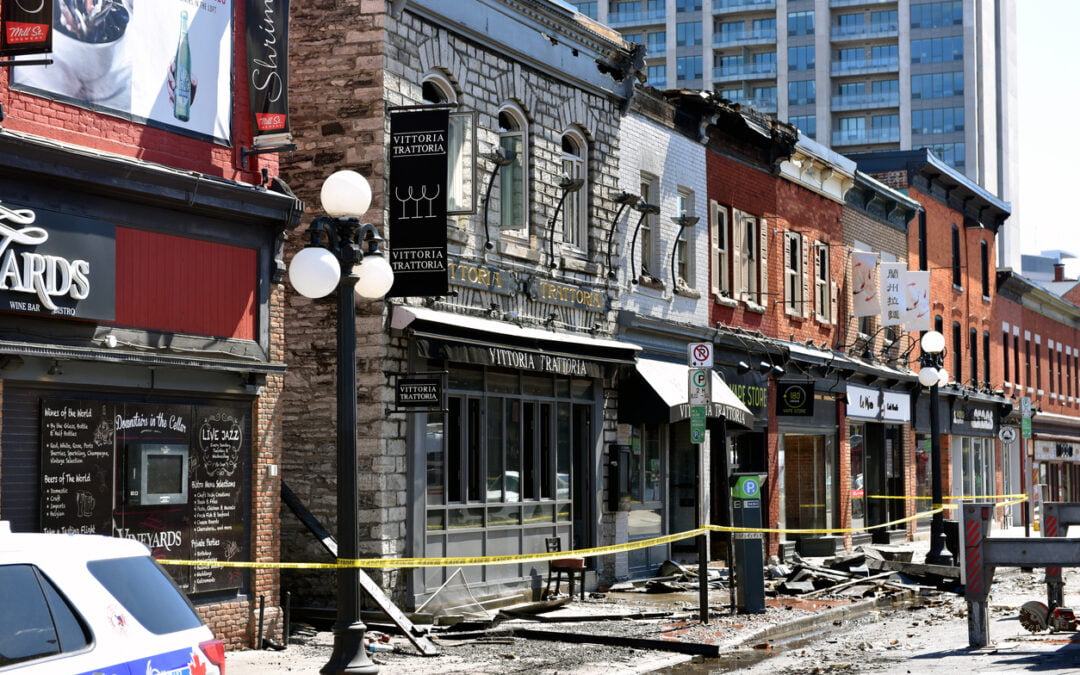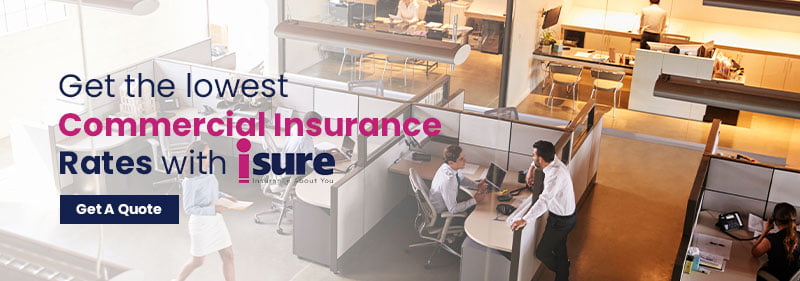Business Interruption Insurance (also known as ‘business continuity insurance’ or ‘business disruption insurance’) is a type of commercial property insurance that covers you for loss of income during periods when you cannot carry out business. Your business’s ability to operate and generate revenue may face unexpected challenges. With business interruption coverage, you may be able to collect the income you would have expected to generate were it not for the unexpected event that caused you to lose it. Let’s take a closer look at BI and how it can help keep your business solvent during this time.
What is this type of insurance?
Business Interruption Insurance is designed to help you recover lost business income and ongoing business expenses while your business is temporarily closed. Most insurance providers offer a form of BI insurance that covers your revenue until your business returns to normal levels—matching revenue levels before whatever unforeseen event caused the sudden loss in the first place. However, sometimes business owners forget to protect themselves against the unexpected.
“Our research suggests that one in five small businesses would shut down within 30 days if sales stopped, yet only 23% have Business Interruption insurance. This means any hiccup in cash flow can put the business at risk. In general, business owners aren’t properly insuring themselves against risks to revenue,” says Brad Plothow, Vice President of Brand & Communications, at Womply.
How can Business Interruption insurance protect you?
This type of insurance coverage can help you to be prepared for the unexpected. It can help your business:
- Prevent the loss of income if your business cannot operate
- Protect yourself from financial obligations that do not stop, even though your business is closed due to a loss including bills and lease payments
- Extra expense coverage is available to pay for additional costs over normal operating expenses, such as relocation expenses
BI insurance usually cannot be purchased as a standalone policy. Most insurers will include it under your commercial property insurance or offer it as an add-on to your base policy.
Who should have Business Interruption Insurance?
As you may never know when an unanticipated event may happen, businesses should put serious thought into getting this type of insurance. Without it, you will lose revenue every day you are not operating, and it could take weeks or months to repair your property and restore it. Lost revenue suffered every day that your business is closed will hinder your ability to pay bills, salaries, and all other expenses.
Any organization can benefit from BI, especially new companies, start-ups, and small to medium-sized businesses (SMBs). New companies and start-ups are less prepared and are not financially stable enough to withstand a disaster causing a sudden closure. They are more likely to close after a loss if they do not have Business Interruption insurance.
This includes the following types of businesses:
- Retail shops
- Restaurants
- Salons
- Manufacturers
- Offices
Types of Business Interruption Insurance
Business Interruption insurance has flexible solutions. According to the IBC, here is a breakdown of the types of coverages available:
- Named perils: This covers losses named as part of business interruption.
- All risk: This covers any threats that are not specifically excluded and is also referred to as actual loss of income. It pays up to the actual loss amount.
- Limited indemnity: This provides you with resources until you resume operations.
- Extended indemnity: This provides you with assistance until your business returns to its normal (pre-disaster) level of operations.
- Contingent business interruption: You are unable to operate because of a disaster to your suppliers or customers, preventing you from generating sales.
- Additional expense: Get resources for extra expenses such as outsourcing work, temporary rentals, and locations.
What is covered by Business Interruption Insurance?
Business interruption insurance policies give you coverage when you’re unable to run your business as usual because of damage claims, such as theft, fire, windstorm, lightning, and vandalism. It can provide compensation for net income loss during the closure period and any ongoing operating expenses.
According to a report from the Federal Emergency Management Agency (FEMA), 40% of businesses do not reopen following a disaster. On top of that, another 25% fail within one year.
Depending on your policy and coverage limit, some of these expenses could include:
- Utilities (hydro, electricity)
- Mortgage, rent or lease payments
- Tax and loan payments
- Cost of moving to a temporary location
- Employee payroll
- Lost profits
- Repairs and construction for rebuilding
COVID-19 NOTE: Unfortunately, most policies will not list pandemic, infectious disease, or government-mandated closures as a covered risk under your BI insurance. You can, however, speak to your isure broker about details of your specific policy.
What is not covered by BI Insurance?
BI insurance helps to protect you against loss events, such as floods, windstorms, earthquakes, fire, and other perils. You can also get protection from other unexpected events that hurt your ability to operate. Examples include:
- A fire at your top supplier’s warehouse.
- A top customer experiences a disaster preventing them from buying from you.
However, BI Insurance does not cover all expenses. Here are some of the events that would not be covered under a BI policy:
- Terrorism
- Pandemics or infectious diseases
- Floods
- Earthquakes
- Pollution damage
- Recovery of income not on your financial records
What is the cost of BI Insurance?
Insurance for business delay can vary greatly, depending on the size and type of business. Estimates can run from anywhere between $100 to a few thousand each year for an add-on endorsement. Insurance companies may also automatically provide this coverage under your commercial property insurance policy.
Factors that influence your premiums are:
- Revenue: Your revenue can impact your Business Interruption insurance quote because insurers will have to provide more in compensation to replace your net income. Therefore, the more you make, the more you’ll pay for insurance as you will also need more coverage if anything happens.
- Type of business: Different industries carry different risks. The higher the risk of making a claim or having to relocate the business because of a claim, the higher the premiums will be.
- Location: Locations more prone to crime or damaging weather will have higher premiums. For example, flood plains and regions that see severe wind storms can raise the cost of coverage.
- Covered perils: See the above list of types of BI insurance.
- Your insurer: Review your policy to make updates and changes to your policy as your business grows. Speak with your isure broker to discuss alterations in coverages annually.
- Number of employees: The more employees you have, the higher your insurance quote will be. More employees expose you to more risk, especially with new employees who may not have the same experience.
- Business insurance history: Multiple claims in the past can raise the price of your Business Interruption insurance because insurers look at your history to predict whether you’ll be making a claim later on.
Preparation helps to prevent losses
As the old saying goes, “You can’t control the weather,” but you can prepare for disasters and other loss events that could impede your ability to operate your business. Some examples are:
- Business Interruption insurance: Add this endorsement to your policy to provide you with additional financial protection.
- Know your policy: Be aware of the things that pose a threat. Make sure that you review your policy to ensure that you have coverage to offset potential risks.
- Have a contingency fund: Put aside funds to serve as backup reserves that you can draw from in the event of a disaster.
- Create a continuity plan: Having a continuity plan will help you be more agile. You’ll be able to recover quicker and limit the effects of a disaster.
More about Business Interruption Insurance
Does this type of insurance cover closure due to a pandemic?
This insurance is designed to cover physical loss or damage. Unfortunately, most policies will not list pandemic, infectious disease, or government-mandated closures as a covered risk under your BI insurance.
Is BII included under Commercial Property Insurance?
Business interruption coverage can usually be included under your commercial property insurance. If you don’t have commercial property insurance but you still want BI insurance, speak to our isure representatives about adding it on as a rider to an existing policy you have.
What is the indemnity period of Business Income insurance?
Your business delay coverage should last for the duration of your indemnity period – the time it takes to restore your business. Typically, this begins from the day your business operations stop due to the damage until the day all repairs are completed and you’re able to resume operations.
Most policies offer a 12-month indemnity period, but this period could be extended based on the amount of time needed to get back up and running. The indemnity period, however, needs to be a reasonable length of time in the eyes of your insurance company and will be outlined in the policy.
Is there a BI insurance deductible?
It depends – some policies include a deductible. The amount will vary depending on your insurer and other factors.
What is the waiting period for this type of claim?
Most policies have a 72-hour waiting period for Business Interruption insurance to kick in. You will not be able to start recovering lost income until after meeting the 72-hour closure threshold.
Our professional insurance brokers at isure understand that no two businesses are alike, and that is precisely why our insurance solutions are customized to match your business needs. Call isure today to discuss if Business Interruption Insurance is needed for your policy!





